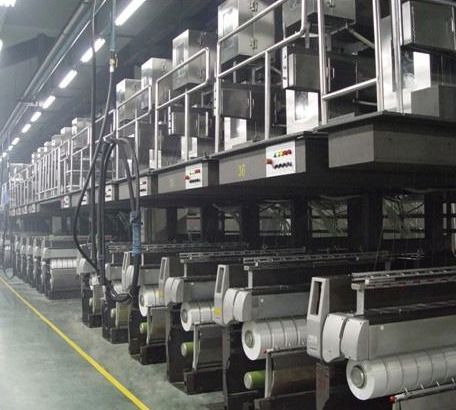- Polypropylene spinning machine
- Polypropylene FDY equipment
- Polyester POY spinning machine
- Polyamide FDY common and high strength equipment
- Polyester FDY equipment
- Polyester high strength equipment
- polyester、Polyamide、 Polypropylene BCF equipment
- Small spinning machine
- All kinds of spinning special parts
- Polypropylene FDY spinning machine is a key equipment for the production of high-performance fibers
- Several silk textile industry renewal projects in Shengze have started construction
- The Winter Solstice marks the rise of Yang energy. In Fubon spinning machines, the Winter Solstice code is revealed, a dialogue of craftsmanship spanning a thousand years
- The establishment conference of Guangzhou Modern Textile and Garment New Quality Productivity Research Institute and the co-construction conference of the textile industry innovation ecosystem were held
- The key points of control in the polypropylene FDY spinning machine process and their relationship with quality

- Contact:Mr. Huang Guofu
- Cel:0086-13901505556
- Fax:0086-519-83341119
- Email:czfb5556@126.com
- Add:No. 288-8 ChangLi Rd, Huangli Town, Changzhou, JS PRV.
Management skills
Heart-to-heart, long-term walk
Essentially, the relationship between managers and employees is an employment relationship. Employees pay value and get salaries. This is like a market transaction, which is entirely yours. Of course, some people may say that it should be the relationship between employees and the company. Although this is accurate, in fact, as the main personnel of the enterprise, many managers also hold the power of life and death of employees, so This relationship should also be between employees.
1. The relationship between managers and employees
However, if a qualified and excellent manager only regards the relationship between employees as an employment relationship, then it is too one-sided, and it is not conducive to the development of team management. Therefore, there are at least the following three relationships between managers and employees.
1. Partnership
The composition of the team must have a common goal, and everyone will strive for it, otherwise it will be a mess, let alone a team, at most what we call a group. There should be a special cooperative relationship between managers and employees, and achieving a win-win situation is the purpose of team management. The victory of either party will not last the team, but will only exacerbate the division of the team.
2. The relationship between mentor and apprentice
Good managers should have the willingness to help employees grow, which can also be said to be the duty of good managers. It is a very important thing for employees to accept the management of the manager in the team, and through the leadership of the manager, continuous training and growth. At the same time, helping employees grow will increase their loyalty and strengthen their trust in the team.
3. Friendship
People have feelings, and employees not only hope that their managers can bring rewards and growth to themselves, but also hope to obtain spiritual comfort in the team. This kind of spiritual comfort is a better metaphor for the relationship between friends. When managers regard employees as friends, they will get a higher sense of satisfaction outside of material. It is also important for building team cohesion. means.
The importance of the second choice to people
People are a particularly important asset of a company. In the current knowledge age, we are engaged in intellectual work. We cannot control the efficiency of people like the industrial age. Instead, we must find ways to improve the efficiency of people. Therefore, it is very important to be able to stimulate people's creativity.
As Kazuo Inamori said, people are divided into three types: spontaneous combustion, combustible, and non-combustible. The person who burns spontaneously is hot and shining like the sun; the person who is combustible is soft and dutiful like the moon; the person who is incombustible is depressed and dull like a dark cloud. The incombustible person not only has no inner will, nor can he push him. They hold a negative attitude towards everything and are indifferent to everything. Such people are not only useless to the development of the team, but will become resistance. Combustible people need to rely on external forces to act. Need to make precise arrangements for them, give clear standards and goals, and at the same time carry out appropriate supervision, so that they can complete their tasks as required. And spontaneous people have missions and ideals, not only can burn themselves, but also pass on positive energy to others. Such people are very scarce. Therefore, it is very important to recruit good people to reduce management costs.
Cultivating people with a developmental vision
After choosing the right person, it is more important to help employees. In my opinion, it is not the relationship between the superior and the subordinate, but the relationship between who helps whom. In contrast, managers are more about empowerment, they must pay attention to cultivating employees, and they must also provide resources and knowledge support for their subordinates, and provide assistance to employees.
Many companies or managers are unwilling to train people because it takes a lot of time and energy. But managers must realize that when recruiting employees, their abilities can match the development of the business, but the business is changing. If they don’t improve their abilities, sooner or later they will not be able to keep up.
There are some managers who believe that money can buy talents and replace them when their abilities can't keep up. This will not be able to precipitate corporate culture. They must be cultivated with a developmental perspective.
Four employee motivation, heart-to-heart exchange
Managers know that motivation is an indispensable skill in organizational management and the core content of individual behavior research. Motivation is directly related to employees' work behavior, work performance, and personal satisfaction. Our incentives must be in line with human nature, and we must pay special attention to the combination of individualization and institutionalization.
1. Pay attention to the timeliness of incentives
The timeliness of motivation is very short, because from the human understanding, people's desires are endless, so no matter what kind of motivation means you use, its timeliness is very short. Even for long-term option incentives, the timeliness is only two years.
In other words, when you announce the equity, the first year and the second year will have a very incentive effect. But after two years have passed, you have to discuss a new incentive plan.
If you do not discuss new incentive schemes, this incentive effect will be diminished and gradually disappear. Therefore, you must pay attention to the timeliness of motivation.
2. The institutionalization of incentives will become a health factor
Once the incentive is institutionalized, it will become a health factor. For example, if bonuses are institutionalized, bonuses will become health-care factors; if incentives are institutionalized, these measures will become health-care factors.
For example, if in a company, excellent people are promoted within two years of work, then promotion is an motivating factor. But as long as you let everyone get it, as if I only need to work for two years, I will definitely be promoted, and then the promotion will become a health care factor.
3. Incentives are contemporary
Incentives are contemporary, and incentives in different eras are actually different.
Motivation requires creativity. It is something that requires managers to devote their creativity and hard work. If you can't create and make hard work, I think it will be difficult for you to make this incentive very effective.
Incentives must be creative, must be updated, must be changed
Incentives are not transactions, incentives are heart-to-heart exchanges, trust and authorization. Therefore, I hope that everyone can make good use of the incentive measures, and you will see that there are teams, partners, and people who will be with you for a long time.
Disclaimer: This article is organized from the Internet, and the copyright belongs to the original author; if there is any infringement, please inform it in time and delete it after verification.
- Several silk textile industry renewal projects in Shengze have started construction
- Polypropylene FDY spinning machine is a key equipment for the production of high-performan
- The Winter Solstice marks the rise of Yang energy. In Fubon spinning machines, the Winter
- The establishment conference of Guangzhou Modern Textile and Garment New Quality Productiv
- The key points of control in the polypropylene FDY spinning machine process and their rela
- A Guide for Managers to Break Through: Empowerment Rather than Control: Helping Enterprise
- The 2025 Textile and Garment Innovation Annual Conference and the Gongqingcheng Down Indus
- The technological upgrade of polypropylene FDY spinning machines empowers the production o
- Textile News: Full-chain Efforts + Cross-border Breakthroughs + Talent Foundation - The Te
- The 2025 China Home Textile Fashion Innovation Conference grandly kicked off in Binzhou




